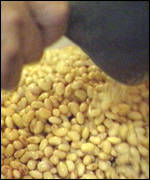Public Perceptions
How these issues affect the consumer at large has yet to be determined. Many see the labeling of GM foods as a kind of self fulfilling prophecy that serves simply to fuel fears from the consumer. One scientist protests that genetic modification is not an ingredient to simply be stuck on the label of a package like the use of a preservative. He argues that “Technology is not an ingredient and not what is put on labels today. Ingredients are put into food” (Ladage, 2000). However, those in favor state that it is the consumer's right to know if their food is genetically modified, and that they have indeed requested to know (Clapp, 2003). They also argue that labeling food will actually work to build consumer confidence and allow them to make informed choices about what they are eating. However, it is interesting to note that in the United States, where labeling is not yet mandated, over 50% of Americans support the use of GM crops, with another 20% simply unsure. The labeling issue brings a chicken and egg type question to the picture. Are Americans more accepting of GM foods in general and less likely to be concerned with labels, or is the opposite true: Are Europeans paranoid about the safety of GM foods because of regulations such as labeling (Ladage, 2000)?
Unfortunately, this issue is far from resolved. The issue of GM labeling seems not to be as cut and dry as originally thought. The politicians and governments involved in this debate have not reached any sort of clear cut solution as to what to do about GMO detection and the labeling of GM food products. Victor argues that formal trade disputes, like the one Thailand filed against Egypt, are not the best way for countries to resolve these issues. In the midst of all the political hand waving, economic issues, and general dancing around the issues, the only way to move forward in the debate is to “keep dancing” (Victor, 2002).
